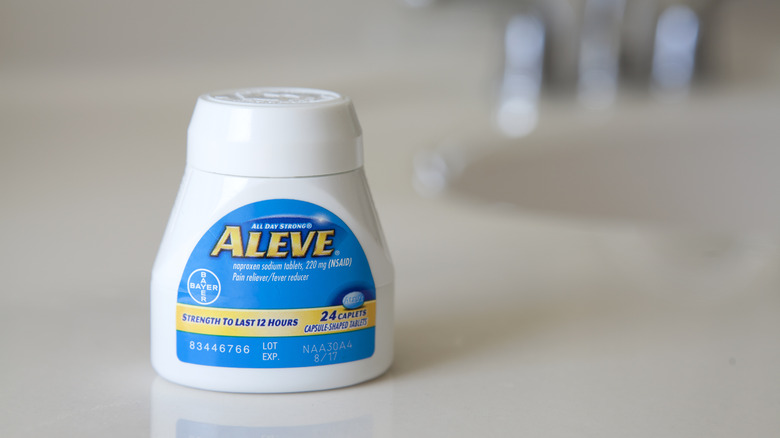Aleve Vs. Ibuprofen: Which One Is Better?
Whenever you have a gnarly headache, painful period cramps, or a minor sprain or strain, you likely open up your medicine cabinet and reach for one of two bottles: Aleve (also called naproxen) or ibuprofen (which goes under the name brands Motrin or Advil, per MedicineNet). You might already prefer one over the other, or perhaps you use them both interchangeably. But do you know the difference between the two? Let's dig into the various ways Aleve differs from ibuprofen and find out which one is better.
According to the NHS, Aleve and ibuprofen are both categorized as non-steroidal anti-inflammatory drugs, or NSAIDs. Such medicines are largely used to "relieve pain, reduce inflammation, and bring down a high temperature." Although NSAIDs are most popular in tablet or capsule form, they're also available as pills, suppositories, creams, gels, and injections.
The NHS notes that the many types of NSAIDs are all similarly effective, but there are differences in terms of longevity and side effects. Here are the chief ways in which Aleve and ibuprofen differ.
The differences between Aleve and ibuprofen
According to Drugs.com, one of the most significant differences between these two medicines is the length of time they work for. Ibuprofen is considered a short-acting NSAID as it has a "relatively quick onset of action." As such, Drugs.com reports that ibuprofen is better than Aleve at treating acute pain, and is better for use in children. But because it's short-acting, though, ibuprofen tablets or capsules need to be taken every four to six hours.
Aleve, on the other hand, is a long-acting drug. That means it has a slower onset of action than ibuprofen but works for longer. As such, it works better for treating chronic conditions than ibuprofen, and it only needs to be taken twice a day.
Another notable difference between these two medicines is that Aleve is more likely to cause gastrointestinal side effects (via Drugs.com). Research shows that your risk of experiencing side effects such as stomach ulcers and stomach bleeding increases the longer you take NSAIDS, but Aleve is more of a culprit than ibuprofen because it's longer acting.
That said, taking either Aleve or ibuprofen carries the same risk of experiencing cardiovascular effects. But for patients who have heart disease that will be taking an NSAID for longer than one month, GoodRx advises that Aleve at doses under 500mg twice daily is safer than ibuprofen. The company also states that with any NSAID, it's wise to take the lowest effective dose and avoid using it long term.

